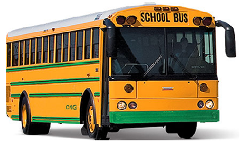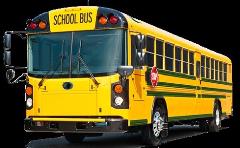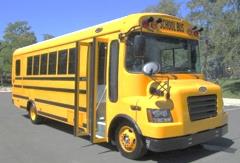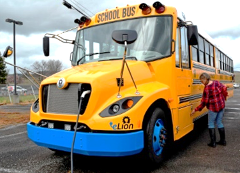Mobile source emissions are major contributors to the potential cancer risk from air pollution. Long-term epidemiological studies of school-age children conducted by the University of Southern California and University of California, Los Angeles indicate that nitrogen oxides and particulate matter have much greater impacts on limiting lung growth in children than believed in the past. These include exhaust emissions from high emitting diesel-fueled school buses that contain smog forming pollutants and air toxics harmful to schoolchildren.
Rule 1195 - Clean On-Road School Buses
In 2001, South Coast AQMD adopted Rule 1195 (PDF) – Clean On-Road School Buses. This rule requires, that when adding or replacing school buses in their fleet, public and private school bus fleet operators acquire alternative-fueled school buses when procuring or leasing new school buses or to retrofit used or existing school buses. This rule applies to those school bus fleets with 15 or more school buses, operated by public and private entities.
Lower Emission School Bus Program
Thousands of older school buses on the road have remained in service primarily due to school districts lacking funds to replace them. In May 2001, South Coast AQMD launched the solicitation for applications for funding to replace older diesel buses with clean buses and to retrofit newer diesel buses. Using state, federal and its own matching funds, South Coast AQMD has provided substantial incentives to public school districts to purchase lower-emission school buses; in turn, these districts have to retire an equivalent number of older, higher polluting diesel buses in their fleets. Charter schools and public school districts are eligible to apply for school bus replacement and alternative fuel replacement. In addition, CNG tanks have a finite life of 15 years, so South Coast AQMD has an ongoing CNG Tank Replacement Program for public school districts to apply for funding when their tanks are about to expire. The Lower Emission School Bus Program is still going strong nearly 20 years after its launch and now includes funding for alternative fuel buses ranging from natural gas to electric. Charter School and Public School districts can also request funds for fueling infrastructure (natural gas and electric charging).
For additional information on school bus funding, click here.



